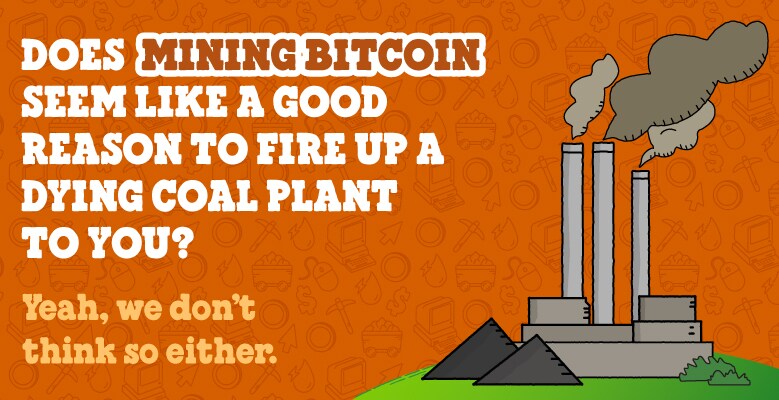What’s Your Love Language?
This Valentine’s Day, show love by standing up for your values and taking action. Join us and the ACLU in writing love letters to the communities and causes you care about!
Does mining bitcoin seem like a good reason to fire up a dying coal plant to you? Yeah, we don’t think so either.
But that’s exactly what Marathon Digital, a bitcoin-mining company, did in Montana.
If that shocks you, keep reading!

Before we go any farther, we should probably take a step back and get a couple of definitions out of the way.
We’re certainly no experts, but here’s what we know (or perhaps we should say, here’s what we’ve read…): Bitcoin is a digital currency (a “cryptocurrency”) that operates independently of central banks. It’s meant to be used as money—a form of money that isn’t controlled by any one person, group, or institution. All bitcoin transactions, trades, etc. are handled through a decentralized, encrypted system known as a blockchain.
“Mining” is how Bitcoin and other cryptocurrencies create new coins through the computational solution of mathematical problems. It’s a complicated process that requires massive computer networks—and massive amounts of energy—to decrypt information in the blockchain and verify, and therefore validate, new transactions.
Bitcoin is the oldest form of digital currency and has attracted the highest number of users—and miners. All that mining consumes a truly shocking amount of energy.
According to a report issued by the White House Office of Science and Technology Policy (OSTP), the US has become a global hub for bitcoin mining.
Why is so much bitcoin mined in the US? Because China banned it. And now massive bitcoin-mining operations are buying up fossil fuel plants to run their computers day and night.
That’s what happened in Montana—with disastrous consequences for the environment and the climate. In 2021, Marathon Digital revived Hardin, a coal-fired power plant that was about to be shuttered.
Carbon dioxide in the atmosphere warms the planet, causing climate change. Bitcoin mining directly contributes to our climate emergency, and Montana is far from the only example of these companies reviving dying dirty-fuel facilities, or building new ones, for the sole purpose of generating virtual coins. Bitcoin-mining operations have also:
The increase in emissions caused by bringing coal plants back online is enormous. A recent study showed that, between 2016 and 2021, each $1 in Bitcoin market value created was, on average, responsible for $0.35 in global climate damages. To put it another way: Bitcoin’s impact on the climate is similar to that of global beef production or the crude oil industry!
Does this make sense in a world facing a climate crisis?
Why does Bitcoin use up so much energy? Because proof of work, its method of verifying and tracking transactions, requires enormous, complex, and energy-gobbling computer arrays. But it doesn’t have to be this way. Ethereum, a rival cryptocurrency, is transitioning to another mining mechanism that will use 99.9% less energy.
The planet needs Bitcoin to follow suit, and soon. Studies have estimated that more widespread use of bitcoin will push us past the 2˚C threshold and into a climate catastrophe. (Perhaps Bitcoin’s recent collapse should be seen, in this light, as good news for the climate!)
There are signs that change is underway. Many companies are saying no to crypto until currencies like Bitcoin can substantially reduce their environmental impact. People are working to keep mining operations out of their communities. Local and state governments are considering placing moratoriums on the development of further high-energy mining projects.
Let’s build on this momentum and keep the pressure on corporations and elected officials to invest in clean energy solutions that actually benefit all of us! Learn more and take action here.
Subscribe Now And We'll Make Sure You Get The Inside Scoop On Ben & Jerry's Fun And Flavors! It's Like Dessert For Your Inbox, And You're Going To Want Seconds.